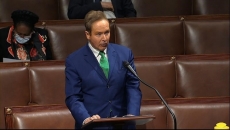The Supreme Court of Canada has ruled that a class-action lawsuit taking aim at video lottery terminals cannot proceed, saying Friday the claims made in the case are bound to fail.
The high court overturned a Newfoundland and Labrador Court of Appeal decision that had cleared the way for the class action, which alleged the Atlantic Lottery Corp.'s VLT games are inherently deceptive, addictive and illegal under the Criminal Code.
The action included as many as 30,000 people in Newfoundland and Labrador who paid the corporation to gamble on VLT games from 2006 to 2012, when the claim was filed.
The lead plaintiffs, retirees Douglas Babstock and Fred Small, were seeking damages equal to the alleged unlawful gain obtained by the lottery corporation through VLT revenue.
The corporation said the plaintiffs could not possibly show the VLT games fall within the Criminal Code's prohibition against three-card monte — a game in which a player tries to follow one of three cards through a series of manipulations and then bets on his or her ability to locate the card.
Plaintiffs pursuing a class action must first go through the certification stage and demonstrate that the pleadings reveal a valid cause of action. Once a class action is certified, it can proceed to trial.
In its decision, the Supreme Court set aside the certification order in the VLT action and struck out the statement of claim in its entirety.
Atlantic Lottery Corp. is satisfied with the outcome, said Greg Weston, a spokesman for the corporation.
"We will stand by our program. As the only regulated video lottery provider in Atlantic Canada, Atlantic Lottery provides its players with a responsible and regulated video lottery program that delivers benefits to our communities."
Kirk Baert, a lawyer for Babstock and Small, said the decision means "the case is over and the issue of the alleged deceptive practices of the Atlantic Lottery Corp. will not be further explored. That is unfortunate."
The plaintiffs had relied on three causes of action:
— Waiver of tort, alleging a breach of a duty to warn of dangers posed by the lottery terminals, including the risk of addiction;
— Breach of contract on the basis there was a contract between players and the corporation to provide safe games fit for use;
— Unjust enrichment at the expense of players.
"Each claim that the plaintiffs have pleaded is bound to fail because it discloses no reasonable cause of action," Justice Russell Brown wrote on behalf of a majority of the Supreme Court.
The court said the plaintiffs' claim that VLTs are similar to three-card monte within the meaning of the Criminal Code, thereby outlawing them, had no reasonable prospect of succeeding.
The text of the Criminal Code provision, taken in full context, suggests the prohibition of games "similar to" three-card monte was directed towards the game's concrete attributes and not towards the abstract feature of deception, the decision said.
"One would expect that, had Parliament sought to prohibit broadly deceptive gambling games, it would have straightforwardly done so," Brown wrote.
Games "similar to" three-card monte must therefore involve, at a minimum, a player betting on the location of an object after a series of a manipulations, he said.
"Nothing in the pleadings describes VLTs as operating in this manner," he wrote. "Thus, the claim that VLTs are similar to three-card monte has no reasonable chance of success."






